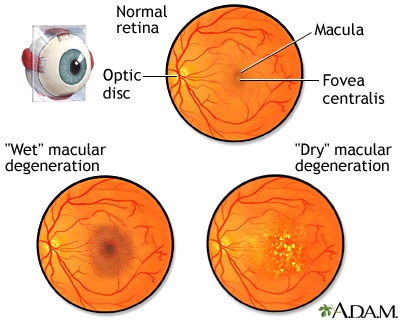Macular Degeneration
Macular degeneration is the leading cause of blindness in Australia, responsible for 50% of all cases of blindness. It is a condition which results in a progressive and painless loss of vision due to an accumulation of deposits underneath the retina. The macula is responsible for your central vision and functions to allow you to recognise faces, drive, read and many other daily tasks.
Call us on (07) 3345 3383 for a comprehensive assessment if you are worried about macular degeneration.

The Amsler grid
This grid is an easy self-monitoring tool that you can use to detect changes in your vision.
- Wear the glasses you normally wear for reading
- Hold the grid at a normal reading distance
- Fully cover one eye and focus on the centre dot
- Repeat on the other eye
If you notice wavy or missing portions of the grid, you should book an appointment with an eye care professional as soon as possible.
You can order a free magnetised Amsler Grid from here.
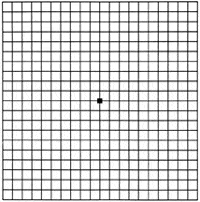
Normal: Straight lines & No missing patches
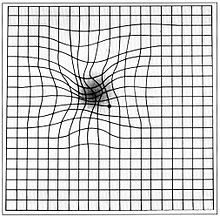
Abnormal: Distorted lines
Risk factors
Macular degeneration is caused by both genetic and environmental factors:
- Age. Those over the age of 50 are at higher risk.
- Family History. Those with a direct family history of macular degeneration have a 50% chance of developing the disease. Therefore it is very important that people with macular degeneration inform their siblings and children if they have been diagnosed with the disease.
- Smoking. Studies have shown that those who smoke are three to four times more likely to develop macular degeneration. Smokers may also develop the disease five to ten years earlier than non-smokers.
Signs of macular degeneration
The signs of macular degeneration are generally quite subtle and hard to detect. This is why it is so important to have regular eye
- Difficulty seeing fine details such as reading
- Distortion where straight lines appear wavy
- Dark patches or empty spaces in the centre of your vision
- Difficulty distinguishing faces
- Sensitivity to glare
- Decreased night vision
The earlier a diagnosis is made, the earlier steps can be taken to slow disease progression. Delayed treatment can increase the likelihood of losing sight.
If you are noticing any of these symptoms, call us on (07) 3345 3383 for a comprehensive assessment!
Call us on 07 3345 3383 or book online today!
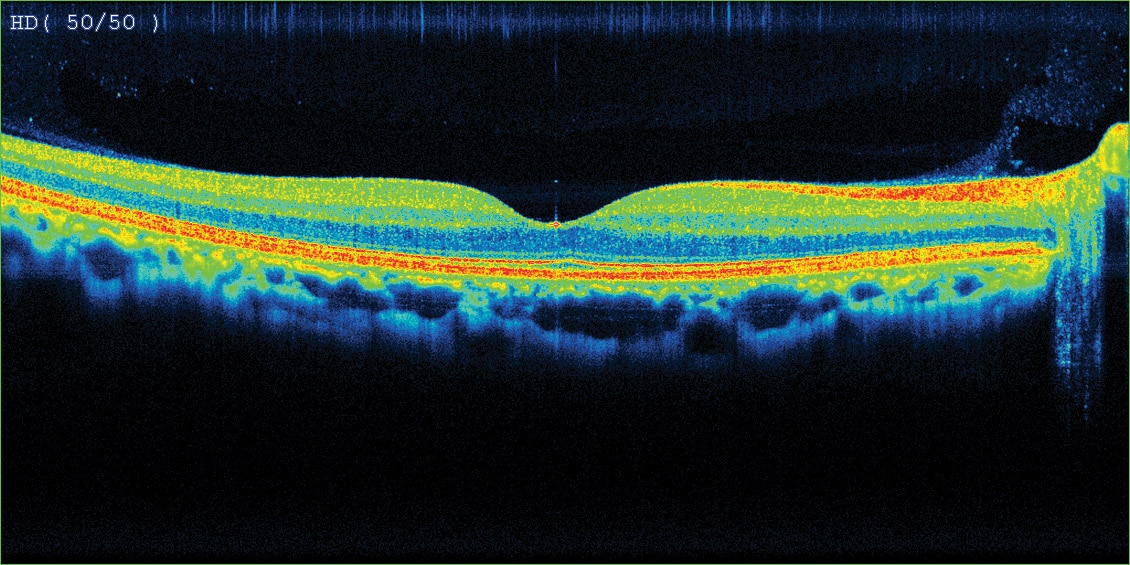
Normal: OCT of normal macula
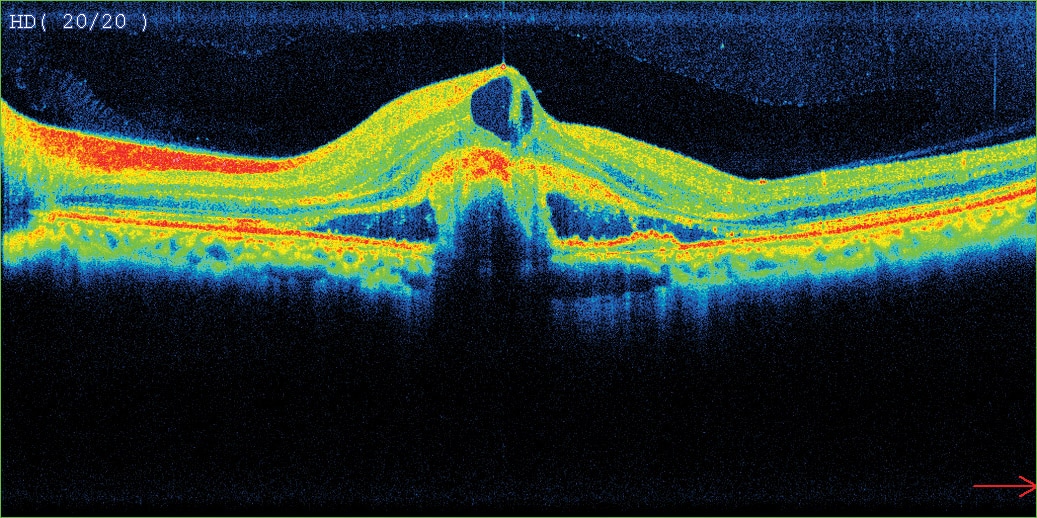
Abnormal: OCT of wet macular degeneration
What happens if I don’t treat it?
People in the late stages of macular degeneration will experience central vision loss. However early detection can significantly delay the loss of vision.
Early detection
We offer professional testing using a combination of the following techniques:
- Pupil dilation using eye drops helps to give a better view of the retina at the back of the eye. This requires a longer appointment approx. 45mins.
- Digital retinal photographs provide a detailed image of the retina, and give a baseline for comparison for future eye exams. This comes free with our comprehensive eye examinations.
- OCT imaging is a non-invasive ultrasound scan of the multiple layers underneath the retina. This scan is now a standard procedure in the diagnosis and ongoing management of macular degeneration. It also provides early detection a variety of other eye diseases.
- Glaucoma and Macular degeneration assessment package. This includes a visual field test (detects early signs of glaucoma), dilated eye examination, 3D digital retinal photographs, and OCT scan. This appointment goes for 1.5 hours.
Contact us on 3345 3383 for an appointment to assess your risk of macular degeneration.
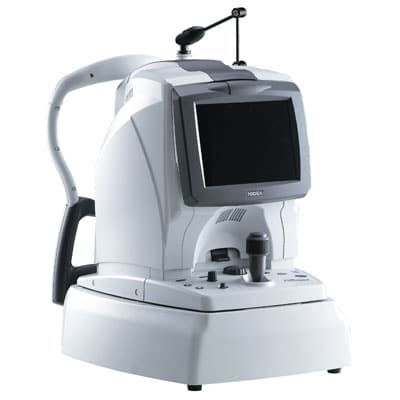
Optical Coherence Tomography (OCT Imaging)
Macular Degeneration Treatment Options
The treatment option will depend on whether you have dry or wet macular degeneration.
Dry Macular Degeneration
Currently, there are no medical treatments available for dry macular degeneration. However positive changes to diet and lifestyle can slow the progression of the disease:
- Nutrition plays an important role in optimising macular health. A healthy, well-balanced diet is good for overall wellbeing as well as eye health.
- Limit intake of fats and oils
- Eat dark green leafy vegetables and fresh fruit daily
- Eat fish two to three times a week
- Choose low GI carbohydrates
- Eat a handful of nuts a week
- Supplements eg. MD Eyes (available in store)
- Quit smoking
- Regular exercise 20 minutes a day, 5 days a week.
Regular exercise at all ages improves balance, strength, mobility and reaction time, and can reduce the risk of injury in the event of a fall. It can also help to manage chronic conditions such as arthritis, diabetes, depression and high blood pressure.
In some cases, dry macular degeneration can turn into the more severe ‘wet macular degeneration’. Therefore if you experience any sudden changes in vision, it is vital to consult with an eye care professional immediately.
Wet Macular degeneration
This is considered the more severe form of macular degeneration. Current treatments do not cure the disease, bit aim to stabilise and maintain the best vision for as long as possible.
Treatments are available through specialist ophthalmologists and can involve:
- Injections at intervals determined by the ophthalmologist in consultation with the patient. The treatment is indefinite and should not cease unless on the advice of the ophthalmologist.
- Laser which is directed at the abnormal retinal area to halt the growth of abnormal blood vessels. This treatment is less commonly used and is used more in conjunction with injections when the condition does not settle completely with injection therapy alone.
